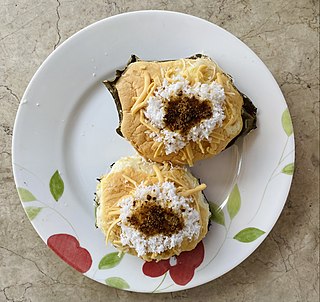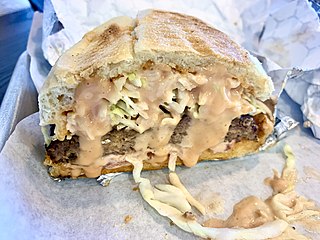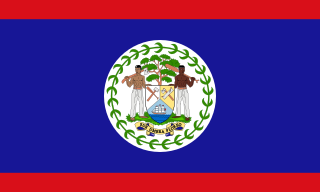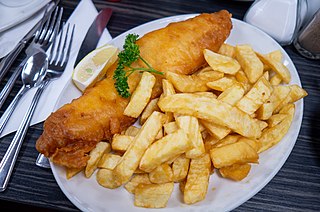
Brazilian cuisine is the set of cooking practices and traditions of Brazil, and is characterized by European, Amerindian, African, and Asian influences. It varies greatly by region, reflecting the country's mix of native and immigrant populations, and its continental size as well. This has created a national cuisine marked by the preservation of regional differences.

Cheesecake is a dessert made with a soft fresh cheese, eggs, and sugar. It may have a crust or base made from crushed cookies, graham crackers, pastry, or sometimes sponge cake. Cheesecake may be baked or unbaked, and is usually served chilled.

Jamaican cuisine includes a mixture of cooking techniques, flavours and spices influenced by Amerindian, West African, Irish, English, French, Portuguese, Spanish, Indian, Chinese and Middle Eastern people who have inhabited the island. It is also influenced by indigenous crops, as well as, crops and livestock introduced to the island from Mesoamerica, Europe, tropical West Africa and Southeast Asia— which are now grown locally. A wide variety of seafood, tropical fruits and meats are available.

Bibingka is a type of baked rice cake in Filipino cuisine that is cooked in a terracotta oven lined with banana leaves and is usually eaten for breakfast or as merienda, especially during the Christmas season. It is also known as bingka in the Visayas and Mindanao islands.

Colombian cuisine is a culinary tradition of six main regions within Colombia. Colombian cuisine varies regionally and is influenced by Indigenous Colombian, Spanish, and African cuisines, with a slight Arab influence in some regions.

Dominican cuisine is made up of Spanish, Indigenous Taíno, Middle Eastern, and African influences. The most recent influences in Dominican cuisine are from the British West Indies and China.

Bammy is a traditional Jamaican cassava flatbread descended from the simple flatbread called casabe, eaten by the Arawaks / Taínos, Jamaica's indigenous people. Variations of bammy exist throughout the Americas. It is produced in many rural communities and sold in stores and by street vendors in Jamaica and abroad.

Belizean cuisine is an amalgamation of all ethnicities in the nation of Belize and their respectively wide variety of foods. Breakfast often consists of sides of bread, flour tortillas, or fry jacks that are often homemade and eaten with various cheeses. All are often accompanied with refried beans, cheeses, and various forms of eggs, etc. Inclusive is also cereal along with milk, coffee, or tea.

Bermudian cuisine blends British and Portuguese cuisine with preparations of local seafood species, particularly wahoo and rockfish. Traditional dishes include codfish and potatoes served either with an add-on of hard-boiled egg and butter or olive oil sauce with a banana or in the Portuguese style with tomato-onion sauce, peas and rice. Hoppin' John, pawpaw casserole and fish chowder are also specialties of Bermuda. As most ingredients used in Bermuda's cuisine are imported, local dishes are offered with a global blend, with fish as the major ingredient, in any food eaten at any time.

A great variety of cassava-based dishes are consumed in the regions where cassava is cultivated. Manihot esculenta is a woody shrub of the spurge family, Euphorbiaceae, native to South America, from Brazil, Paraguay and parts of the Andes.

Togolese cuisine is the cuisine of the Togolese Republic, a country in Western Africa. Staple foods in Togolese cuisine include maize, rice, millet, cassava, yam, plantain and beans. Maize is the most commonly consumed food in the Togolese Republic. Fish is a significant source of protein. People in Togo tend to eat at home, but there are also restaurants and food stalls.

Japanese cheesecake, also known as soufflé-style cheesecake, cotton cheesecake, or light cheesecake, is a variety of cheesecake that is usually lighter in texture and less sweet than North American-style cheesecakes. It has a characteristically wobbly and airy texture, similar to a soufflé when fresh out of the oven and a chiffon cake-like texture when chilled.
Barbadian cuisine, also called Bajan cuisine, is a mixture of African, Portuguese, Indian, Irish, Creole, Indigenous and British background. A typical meal consists of a main dish of meat or fish, normally marinated with a mixture of herbs and spices, hot side dishes, and one or more salads. The meal is usually served with one or more sauces.
French Guianan cuisine or Guianan cuisine is a mixture of Creole, Bushinengue, and indigenous cuisines, supplemented by influences from the cuisines of more recent immigrant groups. Common ingredients include cassava, smoked fish, and smoked chicken. Creole restaurants may be found alongside Chinese restaurants in major cities such as Cayenne, Kourou and Saint-Laurent-du-Maroni.

Tahu campur, literally meaning "mixed tofu" in Javanese language and broader Indonesian language, is an East Javanese tofu dish. The dish consists of sliced tahu goreng, lontong, lentho or sometimes replaced by perkedel, fresh bean sprouts, fresh lettuce, yellow noodles, and krupuk crackers, served in savoury beef stew, garnished with fried onions, and sambal chili sauce. The beef stew soup is seasoned with spices and petis, a type of shrimp paste commonly used in East Javanese cuisine.

Ube cake is a traditional Filipino chiffon cake or sponge cake made with ube halaya. It is distinctively vividly purple in color, like most dishes made with ube in the Philippines.

Hood Famous Cafe and Bar, also known as Hood Famous Bakeshop or simply Hood Famous, is a Filipino bakery with two locations in Seattle, in the U.S. state of Washington. Operating in Ballard and the Chinatown–International District (C-ID), the business is co-owned by spouses Chera Amlag and Geo Quibuyen of Blue Scholars.














